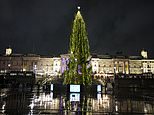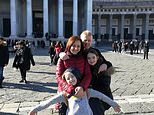
London‘s Trafalgar Square Christmas tree has been branded ‘scrawny’ and ‘half-dead’ compared to their Rockefeller rival in New York.
The tree, which has been gifted annually by Norway since 1947, was deemed as looking ‘rather unwell’ and ‘so sad’ after its lights were turned on earlier this month.
Daily Mail columnist Andrew Neil posted a photo of the two competing trees on X with the caption: ‘When it comes to Christmas Trees London really needs to up its game.’
Commenting beneath, one person wrote: ‘I’m glad someone said it. I didn’t want to be negative but our wonky corn on the cob is a tad underwhelming.’
Another added: ‘By the look of that tree in Trafalgar Square, you’d think London was trying to eliminate Christmas. That’s really bad.’
A third also wrote: ‘It looks like a pickle,’ while a fourth quipped: ‘Maybe it’s a cucumber.’
The Norwegian spruce from Grefsenkleiva, in Oslo’s Forest, is decorated in traditional Norwegian fashion with strings and lights. It is also approximately 20 metres high and is around 60 years old.
For many people, the fact that it is a gift from Norway adds an important sentimental value, as one person explained: ‘It’s the 77th tree we’ve received as a gift from the Norwegians as a token of gratitude for supporting them in WW2. It has more meaning than the Rockefeller tree.’
London’s famous Trafalgar Square Christmas tree has been branded ‘scrawny’
The Christmas tree at Rockefeller Center was lit on December 4, an annual holiday tradition in New York City
Locals described the tree as ‘rather unwell looking’ and ‘so sad’ as they claimed they could see dead wood in photographs posted online
Another person similarly wrote: ‘In this case, less is more plus the London tree is a symbolic gift. The sentiment behind it means it doesn’t need to be flashy.’
A third person argued: ‘The arrival of Oslo’s present is special. For me it’s a reminder that Christmas is just around the corner, marked by a gift from Oslo which is so in the Christmas spirit. It beats all the glitzy lights and the manicured Christmas trees. It is real.’
Another wrote: ‘You’re all missing the point. This tree is a GIFT. It’s around 60 years old and enormous and has to travel by boat to get to us. And the lights – this is the way they are tradionally hung in Norway.
‘It may not be as glamourous as having 50,000 coloured lights intertwined, but this tree is a symbol of friendship and gratitude which we should accept and cherish gracefully.’
Fellow journalist Peter Allen, who is based in France, also took to social media to share Paris’ Christmas tree, which was certainly underwhelming in comparison to the US and UK.
He wrote, sarcastically: ‘This year’s Christmas tree in Paris 75001 is going to leave Londoners and New Yorkers green with envy.’
Commenting beneath the post, one person pointed out: ‘Where’s the rest of it?!’
This comes after Britain’s saddest trees were revealed last month, as one was even labelled anti-festive.
Journalist Peter Allen poked fun at the rather underwhelming Paris tree this year
One person described the Trafalgar Square tree as looking like a ‘wonky corn on the cob’
A group of people take a selfie in front of the brightly illuminated tree at the Rockefeller Center
The Trafalgar Square Christmas tree is pictured in the square before being mounted by specialist crews
The tree was attached to the hook of a crane before being lifted into a vertical position
The tree has been gifted annually by Norway since 1947
One sorry-looking Christmas tree was spotted by the arrivals board at London Euston station this week.
Decorated with gold baubles and guarded by a plastic barrier, the threadbare tree measures around 180cm.
Talk TV‘s Chuck Thomas shared a picture of the tree on X with the sarcastic caption: ‘This will get everyone in the Christmas spirit.’
The post received over 300,000 views as people were quick to blast the sad-looking Christmas tree, which they described as depressing, pitiful and anti-festive.
Meanwhile, over at the Coal Drops Yard near King’s Cross Station, one woman said she had her ‘Christmas cheer stolen from her so fast’ when she looked at the tree erected there.
Ellen filmed her reaction for TikTok and said: ‘I’m about to show you the Christmas tree. I don’t get it. What is this?’
Taking to the comments, one person joked: ‘It looks like it was made on Microsoft paint,’ while another person said ‘it’s giving Tate Modern Christmas’.
This year’s Trafalgar Square tree was cut down by The Lord Mayor of Westminster Cllr Robert Rigby and The Mayor of Oslo Anne Lindboe, during a felling ceremony which took place on Thursday 21 November 2024.
Talk TV’s Chuck Thomas shared a picture of the tree with the caption: ‘This will get everyone in the Christmas spirit’
At the Coal Drops Yard near King’s Cross Station, one woman said she had her ‘Christmas cheer stolen from her so fast’ when she looked at the tree erected there (pictured)
Ellen filmed her reaction for TikTok of the Coal Drops Yard tree and said: ‘I’m about to show you the Christmas tree. I don’t get it. What is this?’
It was then transported to Brevik using an electric truck in a bid to cut the journey’s carbon footprint.
The tree is a gift from Norway in gratitude for the UK’s aid during the Second World War.
King Haakon VII of Norway made popular broadcasts to his country via the BBC while in exile in London during the Second World War.
Aware that he was likely to be found and apprehended by the Nazis after the invasion of neutral Norway in April 1940, he slept in his uniform, fearful they would be able to publish humiliating photographs of him in pyjamas.
Denmark surrendered just six hours after Hitler’s troops crossed its border. To do otherwise would be to risk further bloodshed and almost certain defeat. But Haakon and his government were determined Norway would not collaborate with the Nazis.
His broadcasts from Britain reminded Norwegians to keep their values and his moral fortitude cheered them, just as he was cheered by the defiance of the greater part of the Norwegian people.
Rather than saying ‘when we win the war’, he spoke of the day he would ‘come home’. Loyalty to their constitutional monarch provided the focus for the Norwegian resistance.






